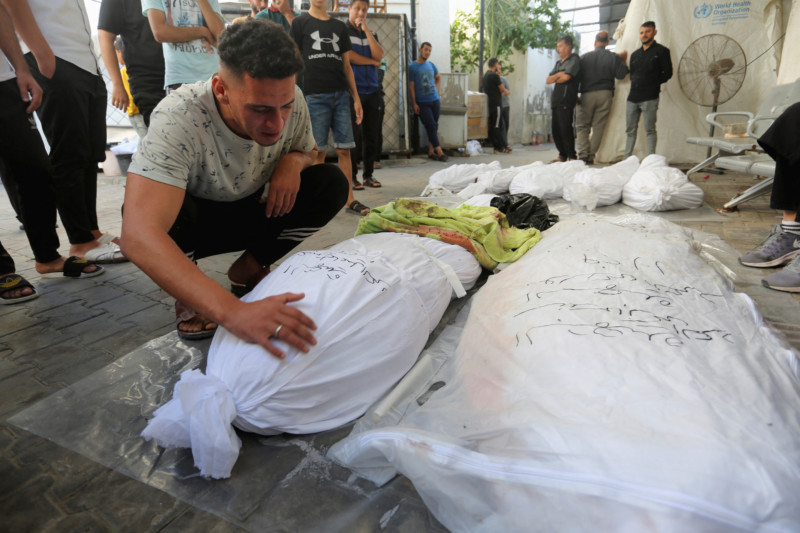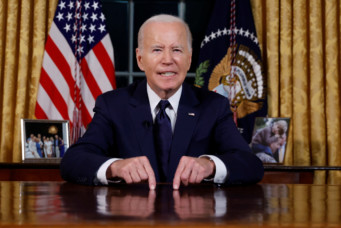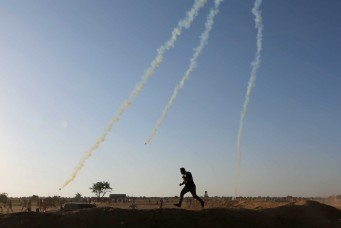Failures of International Law and Violence in Gaza
The recent attacks on Gaza have raised important questions regarding the effectiveness of international law in preventing violence

Recent Israeli attacks on Gaza have killed over 8,200 and displaced 1.4 million. This unprecedented surge in violence has raised important questions regarding the effectiveness of international law, the history of colonization, and the consequences of violent repression of non-violent resistance.
“Israel is a settler-colonial apartheid state and international law is fine with that,” began Jason Beckett, associate professor of law at the American University in Cairo (AUC), during a panel discussion last week.
“As long as Israel is a well-behaved settler-colonial apartheid state, international law has no problems. The simple fact is that international law is a colonial project,” he added.
Hosted by the Department of Political Science and the AUC Political Science Students’ Association, the panel featured presentations from several AUC faculty in the law and political science departments.
“Israel was founded in an act of genocide,” Beckett said, referring to the mass displacement of Palestinians in 1948. “As part of the campaign of apartheid across Palestine, Gaza has been subjected to a blockade for the last 16 years. That blockade has become a slow genocide.”
Also a scholar of law, Nesrine Badawi, associate professor of public and international law, criticized how Israel’s supporters say it has a right to self-defense. She explained how international law does not handle the issue of occupation very clearly; a state’s right to defend itself against a territory it occupies remains legally complicated. This lack of consensus has allowed Israel to claim self-defense against a territory that, despite Israel’s official claims, many international bodies consider as having been occupied for 16 years.
Even within the right to self-defense, Badawi stated, there is a requirement for the state to distinguish between military and civilian targets, and to ensure the response to an attack is proportional.
“The principle of proportionality requires that any attack against a military target does not lead to incidental civilian loss of life that exceeds the military objective,” Badawi explained. “The violence we are seeing now is very clearly indiscriminate and there is no indication of a particular military objective.”
Badawi added that a military objective must be a specific strategic goal, rather than a general attempt to eliminate Hamas, as the Israeli military has stated before. Combined with Israel’s restriction of humanitarian aid throughout the siege, it appears that Israel is committing several violations of international law.
Israel has maintained a blockade against Gaza since 2007, preventing residents from traveling freely, accessing basic goods, and restricting their right to work and education. Amidst the current violence, Israel has only allowed in minimal aid, leaving 2.2 million in dire need of food, water, and medical supplies.
“What were the Palestinians in Gaza to do?” asked Ibrahim Awad, professor of practice at the School of Global Affairs and Public Policy and director of the Center for Migration and Refugee Studies. “If Palestinians accept the occupation, it means they also approve of the murders, of the checkpoints, and of the encroaching settlements.”
Awad continued, explaining how the survival of Palestine is tenuous, threatened by long-standing oppression from Israel. “When Sudanese refugees come to Egypt, they will return when things get better in Sudan. That won’t be an option for Palestinian refugees,” he said.
The ongoing violence also raises the question of why the West continues to support Israel. Bahgat Korany, professor of political science, examined how media coverage of the conflict is causing significant rifts between Western and non-Western perspectives.
“The Western media has promoted three main ideas,” Korany stated. “The first is that Hamas is a terrorist organization. The second is that this militant organization has invaded several communities in Israel, massacred women and children, and took hostages. The third is that these two factors make this a fight between good and evil.”
Korany suggested that this black-and-white view of the violence in Gaza obscures key information.
“The media has failed in its basic function of informing. For instance, it does not explain who Hamas is or why Hamas is not in the West Bank. It has only told you that if you are fighting evil, there is no compromise.”
The use of violent resistance is an incredibly complex issue. Sean Lee, assistant professor of political science, explained how avenues for non-violent forms of resistance have been systematically removed by the Israeli state, such as through sustained and brutal military repression of peaceful protests.
“People are asking, ‘Where is the Palestinian Gandhi?’ Well, he’s probably dead. Maybe he was shot, or maybe he was in prison, or maybe he was deported,” Lee said.
“He was here, but he isn’t now.”



